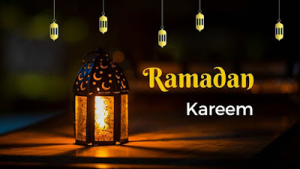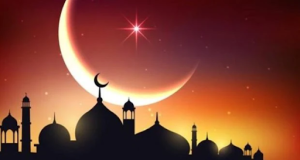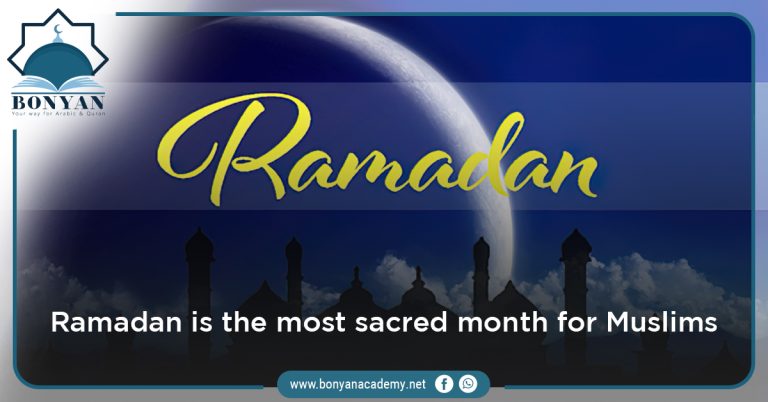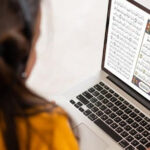Ramadan is the most anticipated month of the year for Muslims. And they start the first day of Ramadan once they see the new crescent moon, a sign for the first day of Ramadan.
Ramadan is the ninth month of the Islamic calendar, and the most sacred month in Islamic culture. So keep on reading if you want to know more about this holy month, and why it is the most sacred month for Muslims.
What is the origin of Ramadan?

Ramadan is a part of ancient Arab calendars and one of the Islamic months. Its name originates from the Arabic root “ ar- ramad” which means burning heat.
Many Muslims believe that the angel Gabriel appeared to the Prophet Muhammad P.B.U.H and revealed to him the Quran in “Laylat Al-Qadar—or the “Night of Power” which is believed to have occurred in this holy month.
So Muslims fast during that month as a way to remember that night of Quran revelation.
Also, many Allah teachings were revealed on laylat al-Qadr to the Prophet Muhammad and he continued to receive revelations for 23 years following laylat al-Qadr.
For all these years the revelations are still the same. Allah S.W.T laid out the five pillars of Islam that are supposed to be the values all Muslims must live their lives, and they are:
- Shahada
This is the most important pillar of Islam, the very profession of the Islamic faith makes any co-existence with any other religion impossible. “I bear witness that there is no deity but Allah, and I bear witness that Muhammad is the messenger of God.” No other form of God is allowed, nor any other prophet.
- Salat
Salat, prayer, is a very important second pillar of Islam. Praying in front of Allah 5 times a day. This only applies if you are not traveling.
- Zakat
Giving 2.5% of your fixed assets such as Gold, Silver, Cash, and Trading Goods that have been in possession for more than a year to the poor and needy. Only applies if you’ve had assets of value more than the threshold but people give it anyway.
- Fasting in Islam during the month of Ramadan (Sawm)
A whole month of fasting from sunrise to sunset and refraining from evil. This only applies if you don’t have any relative disease or you are not traveling.
- Hajj (only if a person can do so)
Visiting the Holy site of Makkah for a pilgrimage once in a lifetime. The obligation is only for Muslims who can afford it. Prophet Muhammad(P.B.U.H) did only one Hajj in his entire lifetime. Islam says that a person comes out of Hajj as sinless as a newborn baby.
As you can see, three of these pillars are conditional. Shahada and Prayer are the most important of them because they are the basic requirements.
What are the teachings of Ramadan?
As we mentioned before, Ramadan is observed to honor the 4th pillar of Islam which is known as Sawm.
There are several reasons that Muslims are required to observe fasting:
1- Develop a fear of Allah
Observing and breaking our fast at the correct time enables us to be punctual. Not eating and drinking (and avoiding sinful speech and behavior ) during the duration of the fast enables us to develop a fear of Allah so that we may avoid such wrongdoings during normal days as well.
2- Sympathize with the poor
Fasting teaches us to sympathize with the poor so that we may know of their hardships. This point is very much self-explanatory. Also, it inculcates generosity toward the poor and thus it leads to compulsory charity (Zakat).
3- Have more self-control
Ramadan fasting rules enable us to exercise self-control and help us to develop patience. For the duration of our fast, we control the urge to drink water and have food.
4- Being more closer to Allah
Fasting during Ramadan teaches us to practice the teachings of Islam and offer Salah and read the Quran. Regarding your point about starvation, I have heard that the human body can live without having food for a few days.
Also, we have Suhoor (meal preceding the fast) and Iftar (meal to break the fast), so there is no starvation as such. The challenge is to resist the urge to drink water and that is where our patience is tested.
How is Ramadan observed?
The holy month of Ramadan is considered a time for reflection and Muslims are prohibited from drinking, eating, smoking, and even engaging in any sexual activity between sunrise and sunset.
Moreover, they are only supposed to have a meal during the night time and intensely study the Quran throughout the month. However, there are certain exceptions to fasting.
While all healthy Muslim adults are supposed to fast during this month, anyone who is sick, elderly, pregnant or breastfeeding, or menstruated is excluded from the same.
Muslims are also advised to monitor their thoughts and control negative emotions like anger, jealousy, and gossiping.
The first meal of the day is taken before dawn. Which means a pre-dawn meal. The fast is broken after having a light meal, after sunset.
How to take care of yourself during Ramadan fasting?

When you are fasting throughout the day, it is important to take care of yourself as the weather can be unforgiving during May. Here are certain things that you must keep in mind during fasting:
- Maintain the hydration level of your body by drinking a lot of water after sunset. Aim to drink at least 8 glasses of water, when you break your fast.
- Avoid caffeinated drinks as they might further dehydrate your body. Instead, try adding an electrolyte to your drinking water for replenishing your body.
- Stick to nutritious and healthy food after sunset and strictly stay away from junk/fried food. Indulging in fried food items may cause bloating and exhaustion.
- Keep a close tab on your salt intake as it may increase your thirst the next day.
The fasting ends with a grand celebration of Eid al-Fitr, where families and friends come together for a grand feast.
Ramadan is a key part of Islam, and we must observe it as Muslims. it is the holy month that will bless us all, so we ask Allah to have mercy on us and reach this holy month well.









